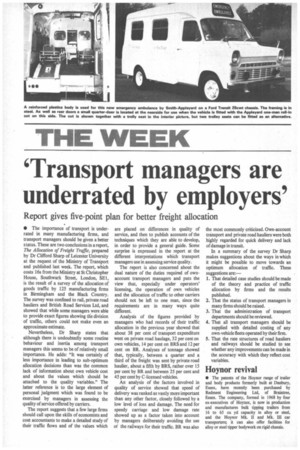'Transport managers are underrated by employers'
Page 38

If you've noticed an error in this article please click here to report it so we can fix it.
Report gives five-point plan for better freight allocation
• The importance of transport is underrated in many manufacturing firms, and transport managers should be given a better status. These are two conclusions in a report, The Allocation of Freight Traffic, prepared by Dr Clifford Sharp of Leicester University at the request of the Ministry of Transport and published last week. The report, which costs 16s from the Ministry at St Christopher House, Southwark Street, London, SEI, is the result of a survey of the allocation of goods traffic by 125 manufacturing firms in Birmingham and the Black Country. The survey was confined to rail, private road hauliers and British Road Services Ltd, and showed that while some managers were able to provide exact figures showing the division of traffic, others could not make even an approximate estimate.
Nevertheless, Dr Sharp states that although there is undoubtedly some routine behaviour and inertia among transport managers this seems to be of relatively small importance. He adds: "It was certainly of less importance in leading to sub-optimum allocation decisions than was the common lack of information about own vehicle cost and about the values which should be attached to the quality variables." The latter reference is to the large element of personal judgment which was found to be exercised by managers in assessing the quality of service offered by carriers.
The report suggests that a few large firms should call upon the skills of economists and cost accountants to make a detailed study of their traffic flows and of the values which are placed on differences in quality of service, and then to publish accounts of the techniques which they are able to develop, in order to provide a general guide. Some surprise is expressed in the report at the different interpretations which transport managers use in assessing service quality.
The report is also concerned about the dual nature of the duties required of ownaccount transport managers and puts the view that, especially under operators' licensing, the operation of own vehicles and the allocation of traffic to other carriers should not be left to one man, since the requirements are in many ways quite different.
Analysis of the figures provided by managers who had records of their traffic allocation in the previous year showed that about 38 per cent of transport expenditure went on private road haulage, 32 per cent on own vehicles, 14 per cent on BRS and 12 per cent on BR. Analyses of tonnage showed that, typically, between a quarter and a third of the freight was sent by private road haulier, about a fifth by BRS, rather over 15 per cent by BR and between 25 per cent and 45 per cent by C-licensed vehicles.
An analysis of the factors involved in quality of service showed that speed of delivery was ranked as vastly more important than any other factor, closely followed by a low level of loss and damage. The need for speedy carriage and low damage rate showed up as a factor taken into account by managers deliberately avoiding the use of the railways for their traffic. BR was also the most commonly criticized. Own-account transport and private road hauliers were both highly regarded for quick delivery and lack of damage in transit.
In a summary of the survey Dr Sharp makes suggestions about the ways in which it might be possible to move towards an optimum allocation of traffic. These suggestions are: 1. That detailed case studies should be made of the theory and practice of traffic allocation by firms and the results published.
2. That the status of transport managers in many firms should be raised. .
3. That the administration of transport departments should be reviewed.
4. That all transport managers should be supplied with detailed costing of any own-vehicle fleets operated by their firm.
5. That the rate structures of road hauliers and railways should be studied to see whether any improvements can be made in the accuracy with which they reflect cost variables.
Hoynor revival
• The patents of the Hoynor range of trailer and body products formerly built at Danbury, Essex, have recently been purchased by Redment Engineering Ltd, of Braintree, Essex. The company, formed in 1968 by four ex-executives of Hoynor, is now in production and manufactures bulk tipping trailers from 16 to 65 Cu yd capacity in alloy or steel, and the Hoynor Mk. II and Mk. HI car transporters; it can also offer facilities for alloy or steel tipper bodywork on rigid chassis.




























































































































































































